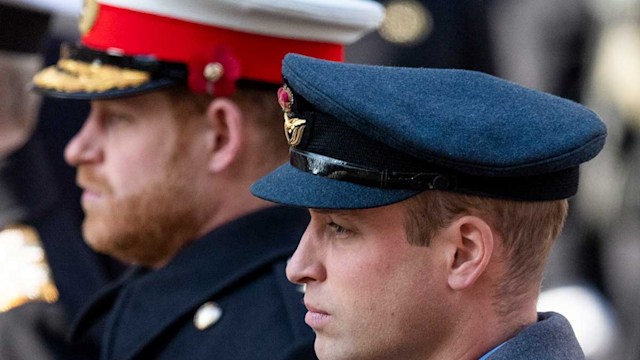Rifts between royal brothers are a hallmark of British history so Princes William and Harry's strife is nothing new.
With the shockwaves from the early publication of Prince Harry's memoir 'Spare' reverberating around Windsor, here are six more noteworthy examples of royal brotherly discord throughout British history. Some even ended in murder - although despite William's alleged barging over of Harry, it seems unlikely their conflict will escalate to this extent...
1. Harold Godwinson and Tostig
The reign of Harold Godwinson, last of the Anglo-Saxon kings, offers a well-known instance of sibling enmity culminating in bloodshed.
Harold defeated and killed his brother Tostig following Tostig's invasion in concert with the formidable Viking, Harald Hardraad; they both perished at the Battle of Stamfordbridge near York. Harold immediately marched south to face the even sterner opposition of William Duke of Normandy in the most famous battle on English soil - the Battle of Hastings (1066).
2. William II and Henry I
In 1100 William II, the second of the Conqueror's three surviving sons and known as Rufus owing to his red hair, was shot by an arrow when hunting in the New Forest.
It was perhaps a case of murder planned by his brother Henry, who became Henry I. (Rufus had been unmarried and childless). Or, more probably, it was a case of the King's hunting companion, a French knight called Walter Tirel, firing an arrow at a deer with fateful inaccuracy.
3. Henry I and the Duke of Normandy
In 1106 Henry I defeated Duke Robert of Normandy, his oldest brother, and imprisoned him in Cardiff Castle, where he festered for his last 29 years.
It was Henry's way of teaching the Duke a lesson for wanting to possess England as well as the duchy his father, the Conqueror, had bestowed on him.
4. Richard I and John
Richard I spent most of his reign (1189- 99) abroad; when he was a leader of the Third Crusade, his army slaughtered Muslims at Acre in the Holy Land.
Later, Richard languished in an Austrian jail and John, his younger brother, tried to displace the absent king who, true to his Lionheart moniker, forgave him - model behaviour for all royal brothers at odds with each other.
5. Edward IV and the Duke of Clarence
In 1477, during the Wars of the Roses, Edward IV imprisoned the Duke of Clarence, his next brother in age, in the Tower where he died mysteriously, probably murdered on Edward's instructions.
Shakespeare twisted the event to suit his dramatic purposes: Richard III became the deed's villainous perpetrator and, to add memorable colour, the Duke was drowned in a butt of malmsey wine.
6. Edward VIII and George VI
In the last century, the most obvious lack of royal fraternity was between Edward VIII, who put his love for Wallis Simpson before kingship, and his younger brother Prince Albert (later George VI), who had no wish for the throne.
Edward abdicated in 1936 and George ruled until his death in 1952.
When royal family rifts turned murderous
Fratricide, or the killing of one's sibling, was part of a wider pattern of murders generally thought to have been committed by royal relatives in the English middle ages. In 1203, King John had his teenage nephew Arthur of Brittany killed. In 1327 Isabella of France was involved in the despatch of her husband Edward II.
In 1400 Henry IV (Bolingbroke) disposed of the proud and overbearing Richard II. In 1471 the tall and handsome Edward IV was behind the killing of the hapless Henry VI. In 1483, most shockingly of all, Richard III ordered, or at least considered, the murder of his nephews Edward V (aged 12) and Richard (aged ten) - the so-called princes in the tower.
Unlikely as it seems, were William and Harry ever to duke it oout in old school fashion, the Prince of Wales has made his feelings on the matter absolutely clear.
You can find out what they are in this video...
WATCH: Who would win in a fight between William and Harry
